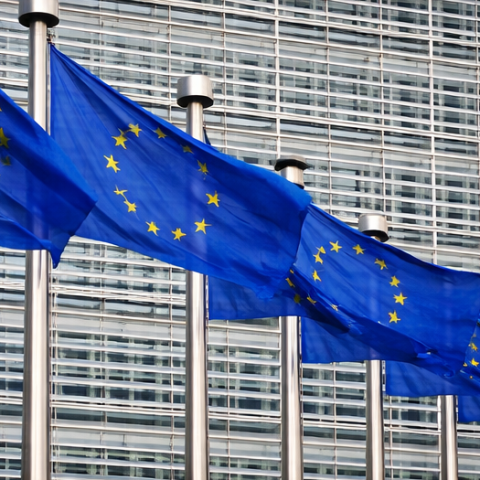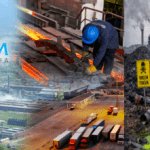By Nicola Nixon
The Regional Environment Centre (REC) Albania is one of an 18-member regional environmental network in central and eastern Europe that was first established in 1990. The organization, the largest of its kind in the country, provides training and education, carries out research, and implements projects aimed at improving the environmental conditions in Albania.
REC was originally initiated by the U.S. government with the aim of providing the post-communist region with a politically neutral body for regional cooperation. Albania’s REC office was opened in 1993 at which time it began by providing grants to NGOs in the environmental field and training in environmental issues. The first activities of the organization, according to its country director Mihallaq Qirjo, were aimed at assisting the development of civil society networks that had not previously existed in the country. As this sector developed, REC was able to extend its services to numerous other stakeholders. Since 2000, REC is also the secretariat for regional environmental cooperation in the Balkan region, a political initiative undertaken at the conclusion of the Balkan crises. REC therefore works closely with various ministries of the environment in the region, including in Albania, and supports those ministries in terms of institution building and the implementation of international conventions and other mechanisms.
One only has to look out one’s window – through the dust and past the rubbish – to appreciate the scale of the task ahead of REC as it attempts to change the beliefs and practices that have contributed to the overwhelming degradation of Albania’s natural environment. Indeed, it is one of the most striking contradictions of this country to an outsider: the combination of awesome natural beauty accompanied by the sludge and filth of everyday refuse. Yet while the urban waste is the most obvious form of the environmental problems that face Albania, Mihallaq explains that it is by no means the most significant and that there are more troubling and potentially more permanent problems that need urgent attention.
Mihallaq spoke this week with The Tirana Times about the major environmental issues Albania is currently facing and the ways in which REC is working to try and rectify them.
TT: Firstly, could you tell us about your own background and how you became involved in environmental issues?
I am trained as a biologist. I finished university in Tirana in the 1990s received a PhD in ecology in 1996. My specialization was on the impact of pollution on soil fauna. Since that time I’ve also taught ecology at the university. So after I finished university studies I specialized in applied ecology. I became involved in REC in 1994. I still teach at the university in ecology and also work at REC. The university brings to REC a link with methodology and students while REC brings to the university more the practical and implementation side of policies. That’s why I still keep up with both of them.
TT: So REC works in a number of different areas of Albanian society. Can you tell us a bit about the areas you work in?
REC is not simply an NGO but is a semi-international organization and doesn’t have to compete in the same way for funding that NGOs do. From 2002 REC much more involved in the implementation of projects on concrete improvement the environmental conditions around the country. At the moment, 60% of REC projects are country based, focusing on Albania and around 40% are in cooperation with other countries in the region. REC is involved in supporting small local NGOs on projects such as greening a particular area. In the last few years, REC has increasingly focused on working with local authorities because it is at that level that environmental management seems to be the biggest problem. Local authorities are more willing to take more initiative, but they do not have the capacities to implement and effectively run environmental management. So this is one of our main target areas. The organization is currently supporting some 55 local NGOs around the country to work directly with local authorities. The biggest of these projects is in Korce where there are six municipalities working together on local strategies to increase their abilities to manage environmental policies and implement local environmental action plans.
We also work a lot with schools. We consider education, especially in Albania, as a tool to improve the environment, particularly with children and young people. Of course environmental education does not solve the problem, but it helps, particularly for the future. Enforcement of the law will enable change to happen and then environmental education will support this movement of the society. Schools are now more and more eager to acquire knowledge of the environmental situation and we consider it our contribution to the development of a citizenship culture. Another major initiative that we have almost completed is the publication of the “Green Pack”; a cross-curricula environmental educational resource for teachers that will be launched in Tirana in September.
We also work with the media by providing up to date information on environmental issues in the country and in the region. The least developed of our targets is business because at the stage Albania is at now, business is not considered to be that sensitive to environmental issues. Yet we do hope to have some future projects with business.
Lastly, we have several cross-border projects with neighbouring countries like Macedonia and Montenegro. The unique position of REC being present in all of the countries of the region allows us to collaborate and offer the same standards on projects etc. As the countries in our region enter the European processes there will be a clear need for transferring know-how from the new member states such as Romania and Bulgaria to the other countries in terms of legislation and environmental standards.
TT: That suggests that the environment will be a significant issue in Albania’s process of European integration?
Yes, the environmental situation in the country is one of the key points for action and improvement especially the ‘hotspots’ around the country and environmental monitoring capacities. Environment is the second priority in the volume of acquis communitaire for the whole of the European Union, after agriculture. So definitely it will be one of the biggest challenges for the country. At the moment, the country is getting some support from Brussels in terms of the creation of a National Environmental Strategy.
TT: Can you explain these environmental ‘hotspots’?
Hotspots are areas that are identified as having a very high level of pollution, much higher than the standard. They present a risk for host populations, biodiversity and other potential environmental damage. They have either been inherited from the past, such as old industrial sites which are shut down now, or they are generated by the development of the country. Among them you can see Porto Romano, where the government is also taking some action by isolating the site from polluting nearby areas, or packing chemicals and removing them out of the country. The second major one is the metallurgical factory in Vlora. Then there is the landfill in Tirana and the metallurgical complex in Elbasan where the air quality is bad. So there is a list of identifiable spots. Most of them are inherited but the country is also facing new hotspots. The air quality in Tirana is making it one of the new, recently developed hotspots.
The question of the hotspots is a complex one. With the ones that are inherited there is an obvious cost, which the government should take care of, in particular the socio-economic costs those sites are having. For example, there are families who have moved from northern or southern parts of the country and are building their homes on those spots. The government should organize their relocation out of the polluted area. Hotspots are areas which need big investments and they present an enormous challenge to the country.
TT: In addition to the ‘hotspots’, what do you see as the biggest environmental issues facing Albania at the moment?
I would divide the major environmental problems into two main groups: the first are the inherited problems and the second are the ones that have developed during the transition period. The ones that are inherited are very problematic as no-one takes ownership of them and sites are left abandoned or with people left living on them. They are considered too costly for the country to deal with.
The newer problems are developing on an increasing basis because of the uncontrolled development of the urban areas, transport, traffic etc. There are new industrial sites; not just big ones but even the small ones can cause big problems of pollution, such as fish factories and leather factories that discharge without much control. So this is the part of the dynamic, active movement of the country which is not being controlled.
Another series of problems are those regarding the exploitation of natural resources and the pollution. In terms of the exploitation of natural resources people tend to speak about forests and deforestation. For a long time now, especially since the democratic changes in the country, there is some control in places where forests are part of the natural living settlements. Indeed, some of the forests have been cut down to the point that they simply can’t be exploited anymore. But there is some revitalization in the forest coverage.
The most problematic thing we see is the land use, especially the arable land use, where arable land is being used for settlement and the building of houses. People tend to think of ownership in a fairly narrow point of view. They think it is their own land so they can build wherever they want to. So, for example, they go into the middle of a field and build their houses there, especially the newcomers, where previously people would have built their houses on the hillsides. Arable land destruction combined with erosion is one of the biggest problems in the country because such a large amount of the land is hilly and mountainous. The arable land that sustains the agricultural production and standards of living of many families in the rural areas – which is half of the population – if this land goes or deteriorates in quality, then we destroy the ground for the development of that strata of the population, which is also the less developed part of the country.
So I do see this as one of the biggest problems. The policies related to land use are still immature and not enforced at the right level. It has a lot to do with unsolved land property rights which leaves many areas abandoned as legal issues are sorted out. At the same time, there is still little control of fauna-use, like fishing in the lakes. Although there are some cooperatives that have been established to control some of the fishing or the hunting, they are still not efficient enough to develop sustainable practices regarding the fish stock or the game stock.
Then there are problems of water-use. Albania is rich with water but the quantity that reaches people is still scarce because of problems of transmission and also because people tend to misuse it because they think of it as a gift from god; an unlimited resource, like so many other things. They consider what they consume but not what they throw away. Water is not yet considered as a resource. Therefore you might see people who are watering or irrigating fields with drinking water, or exploiting the ground water in one area where it is extracted to the degree that it changes the water table and leaves another community without drinking water. This is a problem where there is not effective regulation of a natural resource. Water-use associations or forest-use associations are new phenomena in the Albanian community and they are not yet powerful enough to control the local community in terms of the management of those resources.
Another area is of course the pollution and in this group are those problems that people face and observe on a daily basis from the urban waste to the air quality, drinking water quality, even swimming water quality, and noise pollution in the big city. There were problems with the air quality before, during the communist regime, but they were mainly due to burning bad quality coal. So the air had a percentage of dust in it. But now the bad air quality is coming mainly from construction in process in the cities which makes the dust levels very high.
People tend to observe the dust – and say that it is very polluted because of the dust – but not the non-visible pollution that comes out of the car engines etc. The dust will go when they finish the construction but by then we will have more transport so the quality of the air isn’t going to be much better, particularly where the urban infrastructure doesn’t allow a normal flow of transport. In fact, it will even decrease. But the types of pollutants will change their frequency in the pollution source. In some areas there is also industrial pollution; mainly cement factories and metallurgical factories still causing pollution, as well as stone production activities.
Urban waste seems to be a major problem in the country but it’s actually not as drastic as it seems, certainly not in comparison to loss of habitat or loss of biodiversity. It is more easily solvable if you have a system in place. Yet there is not yet a scheme in the country to segregate waste at the collection point. While the cities do have waste collection, rural areas mostly do not, so they just dump it outside the houses. Even in the cities, transport of waste is organized by private companies with money that does not really cover the costs of cleaning the city and the services needed. So people tend to have to pay an additional small tariff for cleaning and therefore it is a chicken and egg situation so the service is also poor.
And finally we have to deal with the disposal of the waste and the landfill issue. Again, we don’t have a formal standardized land fill in the country, so we cannot really say the small landfills that people have created themselves are illegal since there is no formal one. Most of those are along the rivers so they cause not only ground water pollution but also river pollution that you can see also at the sea coast. Due to this really poor scheme of collection, transport and no proper land fill the whole country suffers. You have to have a scheme in place, without which there is a lack of initiative such as in recycling.
We did actually have one before. During the communist regime there was a scheme for collecting paper, whilst everything that was recyclable was recycled. Of course there were economic incentives, which were significant for people with such a poor standard of living. And people kept and used everything they could so the volume of waste was mainly made up of organic things. Now the composition of waste is much different. It has the same typology as the big consuming societies; where packaging is more important than the product itself. So although this is another environmental problem in the country, as I said, it is not that big a problem as at least the city may be cleaned with some more money and with good environmental management. We can have a landfill somewhere and some money for transporting the rubbish properly. And there are some initiatives in the country where recycling of aluminum cans and paper has started, although not yet with glass.
TT: So there is some improvement?
Yes, there is now some sensitivity that recycling should start. But that is the last stage. I mean, it is better to reduce it and then what cannot be reduced can be reused and what cannot be reused can be recycled. Recycling is sometimes promoted as the thing that solves all the problems but it is has a high energy cost. It is better to reduce the waste than recycle it.










